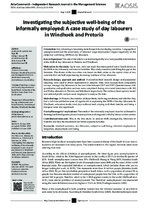| dc.contributor.author | Van Wyk, Anthonie | |
| dc.contributor.author | Blaauw, Phillip | |
| dc.contributor.author | Schenck, Rinie | |
| dc.date.accessioned | 2020-11-06T12:53:10Z | |
| dc.date.available | 2020-11-06T12:53:10Z | |
| dc.date.issued | 2020-06-11 | |
| dc.identifier.citation | Van Wyk et al. (2020). ‘Investigating the subjective well-being of the informally employed: a case study of day labourers in Windhoek and Pretoria’, Acta Commercii 20(1) | en_US |
| dc.identifier.uri | . https://doi.org/ 10.4102/ac.v20i1.825 | |
| dc.identifier.uri | http://hdl.handle.net/10566/5391 | |
| dc.description.abstract | Orientation: Day labouring is becoming more frequent in developing countries. Long spells of
unemployment and the uncertainty of informal wage employment impact negatively on the
subjective well-being (SWB) of day labourers.
Research purpose: The aim of the article was to investigate the level and possible determinants
of the SWB of day labourers in Pretoria and Windhoek.
Motivation for the study: Up to now, only one study has been carried out in South Africa on
the SWB of day labourers and none in Namibia. This study aimed to start filling this gap in the
literature. The choice of the two cities was based on their status as the capital cities of two
countries that are both experiencing increasing numbers of day labourers.
Research design, approach and method: A mixed-method research design and purposeful
sampling were used to obtain representative samples. Data were sourced from comparable
surveys amongst day labourers in the two cities between 2015 and 2017. Questionnaires with
quantitative and qualitative sections were completed during structured interviews with 290
and 80 day labourers in Pretoria and Windhoek respectively. The ordinary least squares model
and ordered-probit analysis were employed to analyse the data.
Main findings: In Pretoria, the number of dependents, the living conditions and whether they
had a full-time job before were all significant in explaining the SWB of the day labourers. In
Windhoek, education levels, total days without food, staying with their families and being a
foreigner were also significant.
Practical/managerial implications: The needs of the informally employed must be addressed in
the integrated development plans of municipalities and integrated with day labour worker centres.
Contribution/value-add: This is the first study to analyse SWB amongst day labourers in
Namibia and lays the foundation for future expanded studies | en_US |
| dc.language.iso | en | en_US |
| dc.publisher | OASIS | en_US |
| dc.subject | Informal economy | en_US |
| dc.subject | Day labourers | en_US |
| dc.subject | Subjective well-being | en_US |
| dc.subject | Informal employment | en_US |
| dc.subject | Well-being | en_US |
| dc.title | Investigating the subjective well-being of the informally employed: a case study of day labourers in Windhoek and Pretoria | en_US |
| dc.type | Article | en_US |

